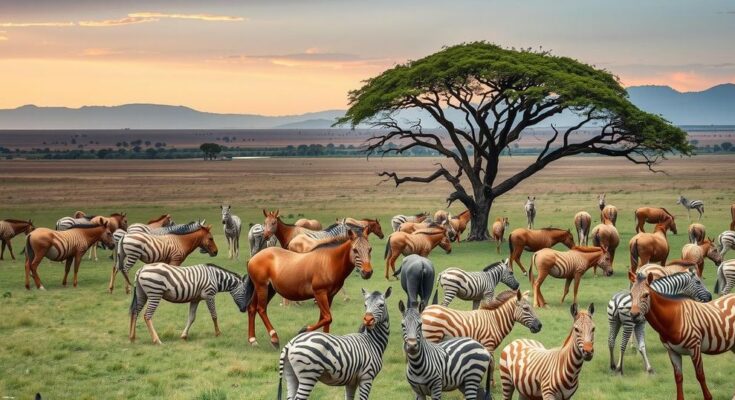Recent changes in climate are disrupting the migration patterns of wildebeest and other herbivores in Serengeti National Park, with notable shifts in behavior due to altered rainfall and rising temperatures. Research indicates that these alterations could have profound effects on the ecosystem and the wildlife’s survival.
In the expansive savanna of Serengeti National Park, a significant observation can be made regarding the herbivore population, particularly the wildebeest, which are now congregating in areas with recent rainfall. Guiding a safari, Julieth Jones identified a group of wildebeest that had migrated in search of more nutritious pastures following a rare downpour. Their behavior has shifted notably, as ecologist Gadiel Tanapa pointed out, with current migration patterns deviating from normal expectations. Typically, during the dry season, wildebeest would migrate north toward the Maasai Mara reserve; however, recent changes in weather patterns are disrupting these historic migration routes.
The seasonal migration undertaken by thousands of wildebeest, zebras, Thomson’s gazelles, and elands is renowned as one of the largest land migrations on Earth. This annual event, driven by the search for food and water, now faces challenges due to climate change. Research has indicated that the ecosystem is confronting serious threats, including recurrent severe droughts and rising temperatures, which have increased by approximately 4.8 to 5.8°C over the past 60 years. Such climatic shifts are altering the natural behaviors of these species and disrupting their established migratory routes.
Consequently, the impacts of climate change pose a direct challenge not only to wildlife but also to the health of the entire Serengeti ecosystem. Continued monitoring and research are essential to understanding how these changes will affect future migratory patterns and the overall biodiversity of the region. The evidence underscores the urgency of addressing climate change to ensure the vitality of the Serengeti and its wildlife.
As highlighted in recent studies, the evolution of both the climatic conditions and animal behaviors in this region signals a profound transformation within one of Africa’s most iconic natural settings.
Climate change has emerged as a formidable influence on ecosystems worldwide, particularly affecting established patterns in wildlife behavior, such as animal migrations. The Serengeti National Park in Tanzania is recognized for its rich biodiversity and large-scale migratory events, including those of the wildebeest and other herbivorous species. Recent scientific studies have documented notable shifts in migratory routes and seasonal behaviors as animals respond to changing weather patterns, with significant implications for both ecological balance and tourism in the region.
In summary, climate change is drastically affecting the migration patterns of key herbivore species in the Serengeti. The past seasonal habits have shifted due to altered rainfall patterns and rising temperatures, resulting in significant ecological repercussions. Continued investigation and proactive measures are necessary to adapt to these changes and protect the ecological integrity of the Serengeti and its wildlife populations.
Original Source: www.lemonde.fr




